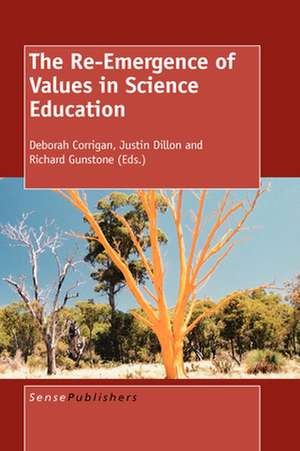The Re-Emergence of Values in Science Education
Editat de Deborah Corrigan, Justin Dillon, Richard Gunstoneen Limba Engleză Hardback – 29 sep 2008
| Toate formatele și edițiile | Preț | Express |
|---|---|---|
| Paperback (1) | 412.29 lei 38-44 zile | |
| Brill – 31 dec 2006 | 412.29 lei 38-44 zile | |
| Hardback (1) | 769.06 lei 38-44 zile | |
| Sense Publishers – 29 sep 2008 | 769.06 lei 38-44 zile |
Preț: 769.06 lei
Preț vechi: 998.78 lei
-23% Nou
Puncte Express: 1154
Preț estimativ în valută:
147.16€ • 154.04$ • 122.48£
147.16€ • 154.04$ • 122.48£
Carte tipărită la comandă
Livrare economică 27 martie-02 aprilie
Preluare comenzi: 021 569.72.76
Specificații
ISBN-13: 9789087900366
ISBN-10: 9087900368
Pagini: 288
Dimensiuni: 156 x 234 x 18 mm
Greutate: 0.58 kg
Editura: Sense Publishers
Locul publicării:Netherlands
ISBN-10: 9087900368
Pagini: 288
Dimensiuni: 156 x 234 x 18 mm
Greutate: 0.58 kg
Editura: Sense Publishers
Locul publicării:Netherlands
Descriere
Descriere de la o altă ediție sau format:
Issues relating to values have always had a place in the school science curriculum. Sometimes this has been only in terms of the inclusion of topics such as ‘the nature of science’ and/or ‘scientific method’ and/or particular intentions for laboratory work that relate to ‘scientific method.’sometimes it has been much broader, for example in curricula with STS emphases. Of importance to aspects of this proposal is that different countries/cultures have had different traditions in terms of the place of values in the school [science] curriculum. One obvious very broad difference of this form is the central place in [science] education thinking in many European countries of bildung, and the complete absence of this construct from most [science] curriculum thinking in English speaking contexts. There are numbers of such country/cultural differences.
In the 1990s many countries moved towards various conceptualizations of Outcomes Based Education - OBE (sometimes so labelled and sometimes not). It was usual (but not universal) for OBE focused science curricula to have constrained views of the values that should be implicit and explicit in curriculum; that is views concerned only with ‘the nature of science’ and ‘scientific method’ (both usually seen as quite unproblematic).
Currently there are a number of education systems that are changing again, and choosing to move away from Outcomes Based Education (for example, South Africa and several Australian states). One of the most interesting features of many of these movements is the re-embracing of a wider view of the science curriculum, including a reconsideration of the nature and place of the values associated with science in the purposes for and approaches to science education.
Issues relating to values have always had a place in the school science curriculum. Sometimes this has been only in terms of the inclusion of topics such as ‘the nature of science’ and/or ‘scientific method’ and/or particular intentions for laboratory work that relate to ‘scientific method.’sometimes it has been much broader, for example in curricula with STS emphases. Of importance to aspects of this proposal is that different countries/cultures have had different traditions in terms of the place of values in the school [science] curriculum. One obvious very broad difference of this form is the central place in [science] education thinking in many European countries of bildung, and the complete absence of this construct from most [science] curriculum thinking in English speaking contexts. There are numbers of such country/cultural differences.
In the 1990s many countries moved towards various conceptualizations of Outcomes Based Education - OBE (sometimes so labelled and sometimes not). It was usual (but not universal) for OBE focused science curricula to have constrained views of the values that should be implicit and explicit in curriculum; that is views concerned only with ‘the nature of science’ and ‘scientific method’ (both usually seen as quite unproblematic).
Currently there are a number of education systems that are changing again, and choosing to move away from Outcomes Based Education (for example, South Africa and several Australian states). One of the most interesting features of many of these movements is the re-embracing of a wider view of the science curriculum, including a reconsideration of the nature and place of the values associated with science in the purposes for and approaches to science education.













